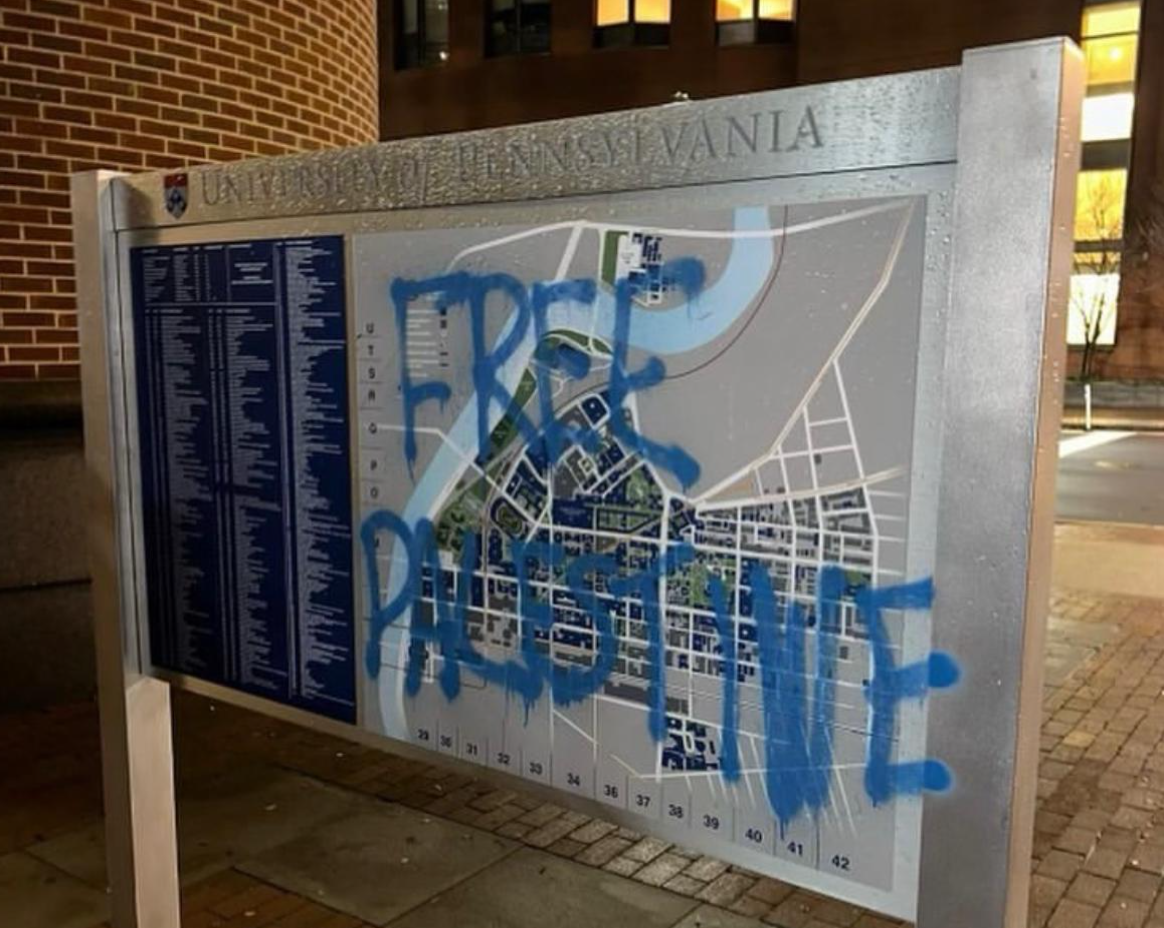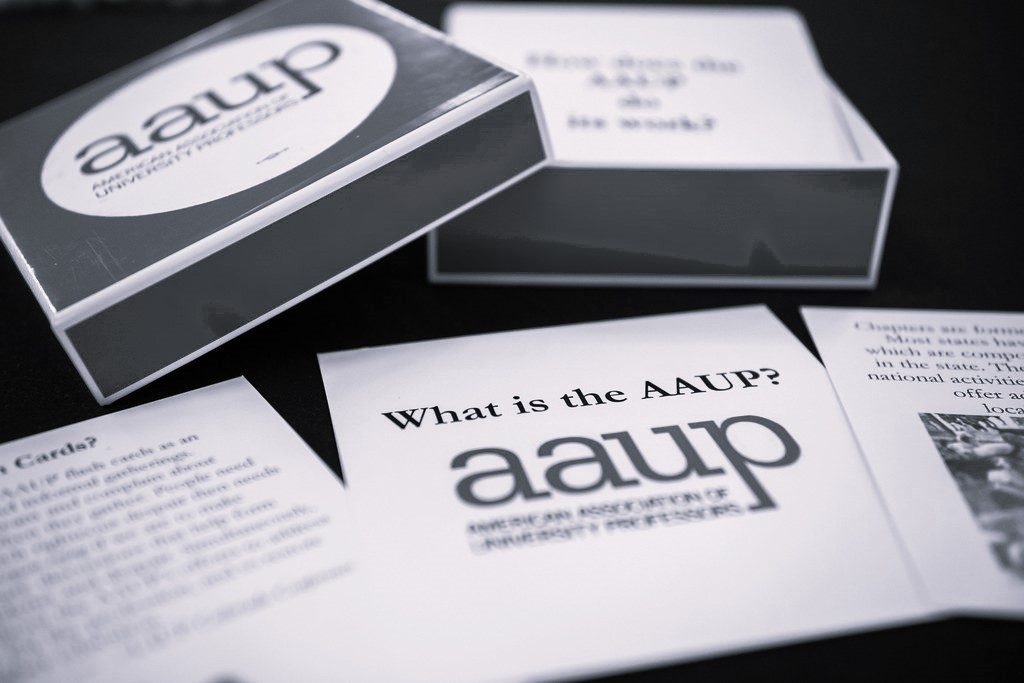Recent anti-Zionist criticisms of Penn Hillel are laden with intellectual dishonesty
Graffiti on a sign at Penn from December 3, 2023. / Photo credit: Noah Rubin
By Noah Rubinson
Just a few days before the six-month anniversary of the greatest loss of Jewish civilian life since the Holocaust, The Daily Pennsylvanian published an opinion piece calling for nothing short of a complete condemnation of the state of Israel by Penn Hillel. Penned under the anonymity of Penn Chavurah—a self-proclaimed leftist student organization for progressive Jews that has a tenth as many registered members as Hillel has independent student communities and groups—the article attempts to vilify Penn Hillel for hosting its annual Israel Week festivities amidst the ongoing conflict in the Gaza Strip.
Laden with misleading hyperbole and blatant misrepresentation of Hillel’s efforts, it is sadly unsurprising that the piece did not face more scrutiny prior to publication. Within the first sentences of the column, the authors make a series of juxtapositions between Hillel’s week-long celebration of Israeli heritage and the tragic collateral damage we are seeing in Gaza—a consequence of Israel’s siege on a terrorist power that strategically positions its military strongholds within critical civilian centers like hospitals and schools—in a manner that intentionally misleads readers via a deliberate lack of contextualization. The authors write, for instance, that “as Gazans starve to death, Hillel hosts Israel-themed cooking workshops,” placing responsibility for the rampant hunger within the Gaza Strip exclusively with Israel while disregarding the hundreds of land and airborne aid and food packages of which the Israeli government is facilitating delivery to Gaza on a daily basis. Instead of acknowledging Israel’s ongoing efforts to alleviate the tragic food and supplies shortage in the war-torn Gaza Strip, Penn Chavurah decided instead to paint Hillel as a community that disregards the plights of the Palestinian people while feasting on Israeli dishes.
Only two sentences later, the article falsely accuses Hillel of “never” asking a Palestinian for their thoughts on seeking a solution to the Palestinian-Israeli conflict. Had the authors done their research, however, a simple conversation with any one of the dozens of participants in Hillel’s many fellowships in Israel would have revealed the opposite to be true. During my trip to Israel as a member of Hillel’s Habibi Fellowship, I was fortunate to have the opportunity to travel to the Friends of Roots’ Dignity Center, which provides a neutral space for Israelis and Palestinians to come together and bridge the bitter cultural divide which separates the two communities.
As part of this experience, my peers and I had the opportunity to listen to both an Israeli rabbi and a local Palestinian community leader as they discussed the tremendous progress they had achieved in just a few short years toward fostering understanding and cooperation between the Israeli and Palestinian peoples. This discussion included, of course, an extensive dialogue surrounding what both figures viewed as the best path toward finding an enduring solution to the decades-old conflict between Israel and Palestine, providing a cherished and unique opportunity to hear the perspectives of representatives from both sides of the conflict. In this way and many others, Hillel has and continues to make an active effort to not only provide a platform for Palestinians but also to present their perspective to Penn students, contrary to the claims of Penn Chavurah.
The progressive anti-Zionist organization goes so far as to suggest that Hillel is somehow culpable of suppressing dialogue on the Israel-Hamas conflict due to the organization’s failure to condemn the Penn administration’s decision to “discipline [the authors’ peers] for simply using the library while their posters displaying the faces of murdered Palestinian journalists remained visible on library tables”—a description which grossly misrepresents the series of events which culminated in the protestors’ removal from Van Pelt.
In reality, the protestors were asked to vacate the library room they occupied after repeatedly failing to comply with administrators’ requests to remove the posters that they had pasted over the walls and windows (which, according to University officials, is in violation of University policy) depicting graphic images of Palestinian academics tragically and inadvertently harmed or killed in Israel’s offensive against Hamas. Despite eventually agreeing to remove the posters from the walls and windows, the group was ultimately asked to leave Van Pelt entirely after administrators continued to receive complaints from students that the presence of the protestors and remaining posters covering various pieces of furniture was impeding their studies. The protestors were not, as the article claims, simply using the space—they were abusing the privilege to access such a space in a way that disturbed their peers. Here, a quick glance over the article linked in Chavurah’s opinion piece reveals a clear, deliberate effort to distort the truth in order to construct a specific narrative, leading one to wonder why such an article was not properly vetted in the first place.
Without commenting on the loosely connected political ramblings of the next few paragraphs—which absurdly suggest that Hillel’s condemnation of former President Liz Magill’s congressional testimony (stating that calling for genocide against Jews does not constitute harassment and bullying on Penn’s campus) is in some way evidence that the organization is sympathetic to neo-Nazis or that it endorses former President Donald Trump—we find ourselves at the end of the end of the piece.
It is at their op-ed’s conclusion that Penn Chavurah exposes how fundamentally it misunderstands the organization in which it claims to want membership. “Israel Week forces us to choose between Hillel’s version of Jewish unity and our Jewish values,” the article reads. “We ask of Penn Hillel what we have always asked. Open Hillel. Call for an immediate ceasefire and an end to apartheid. Let’s raise the call together. We are ready when you are.” For those unfamiliar with Hillel or the Jewish community at Penn and beyond, let me try to help you understand how out of touch these statements truly are. The Jewish community is not suffering from a massive division over the conflict in Gaza: among Jews ages 18-29, only 26% oppose the IDF’s military assault against Hamas; among those over the age of 50, that figure falls to 7%. This is also not a matter of political affiliation: among Jewish Democrats, 84% support Israel’s military offensive; among Jewish Republicans, the number is 87%.
Judaism and Israel do not exist independently. Jewish presence in Israel can be traced back further than almost any other civilization in human history, with the earliest evidence appearing in the 13th century BCE in the Kingdom of Israel. Nor do Hillel and Israel exist independently. In fact, it is the second point of Hillel’s mission statement that the organization exists to “encourage students to deepen their engagement with Israel and other Jews all over the world.” For Hillel to condemn Israel for defending its sovereignty in the wake of a terrorist attack equivalent in scale, per capita, to fifteen 9/11s would be for Hillel to abandon its core mission. For Hillel to call for an “end to apartheid” (which, considering that Israel’s Arab community comprises nearly a quarter of the population and at least a tenth of its government, must be a call for the abolition of Israel in its entirety) would be for Hillel to spit in the face of the Jewish community which it was founded to serve. In making such a demand, the authors appear to know very little about Hillel or their fellow Jewish students.
At a time when antisemitism is on the rise everywhere, it is the responsibility of all of us to fight against the proliferation of false claims that exacerbate the growing hatred towards the Jewish people. While Penn Chavurah was able to successfully shroud their spite for Israel behind claims to membership in the Jewish community, we must take care to never again fall victim to the deceitful claims that have fueled antisemitism throughout history. While it is shameful to see Penn Chavurah display such insulting contempt for the intellect of their peers, it is perhaps more concerning that the piece’s narrative was not scrutinized by The Daily Pennsylvanian in the way they have those condemning antisemitism through the use of editor’s notes and harsh standards. We must all do better.
Noah Rubinson is a junior in the Huntsman Program in International Studies and Business from Houston, TX. His email is rubinson@sas.upenn.edu.




